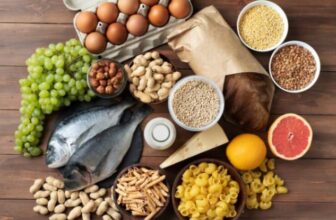
[adinserter block=”3″]
Ulcerative Colitis (UC) is marked as an inflammatory bowel disease that leads to ulcers and inflammation in your large intestine, impacting your whole digestive system. The common symptoms are fatigue, stomach pain, diarrhea, bloody stools, and weight loss. When UC symptoms suddenly become more intense, the nutrition intake of most individuals drops as they prefer eating less due to diarrhea and pain. If these symptoms last for a long period, it can lead to malnutrition and nutrient deficiencies. Here, a well-balanced diet can come to a rescue! A 7-day meal plan for ulcerative colitis is specifically designed to boost gut health and prevent discomfort caused by this digestive disorder. All the foods it includes help manage the symptoms and effectively facilitate your digestive wellness. Read the article for a comprehensive guide on our curated 7-day meal plan and its importance, and learn what foods to include and what to avoid in your daily diet. Let’s start!
Importance Of A 7-Day Meal Plan For Ulcerative Colitis
Ulcerative Colitis mainly impacts the function of the colon and rectum, located in the lower part of the digestive tract. It leads to ulcers and inflammation in these two parts and the symptoms include abdominal pain, rectal bleeding, fatigue, and diarrhea. Managing this chronic inflammatory condition needs a holistic approach, and one effective way is following a well-curated diet. A 7-day meal plan for ulcerative colitis is important for many reasons, some of which are given below:
- Manage Symptoms Flare-Ups: Helps reduce symptoms and prevent the frequency and severity of their flare-ups (becoming more intense).
- Meet Nutritional Needs: Prevent nutritional deficiency by ensuring the proper nourishment of the gut with essential nutrients.
- Promote Gut Health: Ulcerative Colitis can severely impact the beneficial gut bacteria but with a well-balanced diet plan that includes nutritious foods, it is possible to restore those bacteria and enhance gut health.
- Help Gain Weight: Some people experience weight loss and the major factors contributing to it include insufficient nutrient absorption, less appetite, and diarrhea. A well-structured meal plan can help gain healthy kilos by nourishing the body with enough nutrients and calories.
What Is The 7-Day Meal Plan For Ulcerative Colitis?
We have thoroughly explained the 7-Day Meal Plan for Ulcerative Colitis. It consists of lean proteins, healthy fats, complex carbs, and fiber-rich foods that are easy to digest and can provide enough nutrition to reduce inflammation and promote overall gut health. Take a look at this well-balanced diet plan:
Day 1
Breakfast:
- Have oatmeal deliciously topped with a handful of fresh, organic berries and some honey.
- Scrambled eggs with some leaves of spinach along with gluten-free toast on the side.
Lunch:
- Mixed green vegetables, lemon vinaigrette, and roasted chicken with a healthy quinoa salad.
- Turkey wraps with nutrient-dense cucumber, carrot sticks, lettuce, and avocado.
Dinner:
- Cooked salmon along with cooked quinoa and steamed broccoli.
- Enjoy grilled chicken breast with some stir-fried kale and roasted sweet potatoes.
Snack:
- Banana with 1 or 2 tablespoons of organic almond butter.
Day 2
Breakfast:
- Prepare a smoothie by blending banana, protein powder, almond milk, and spinach.
Lunch:
- Grilled chicken, avocado, cherry tomatoes, and mixed veggies with a dressing of lemon and olive oil.
- Veggies sauté with organic brown rice and tofu
Dinner:
- Lean beef gently stir-fried with broccoli over the fluffy cauliflower rice.
- Have baked cod along with cooked quinoa and grilled Brussels sprouts.
Snack:
- Enjoy Greek yogurt with a drizzle of honey and almonds as a topping.
- Have some 5-7 gluten-free crackers by dipping in hummus.
Day 3
Breakfast:
- 1 or 2 slices of egg toast with 1/2 fresh avocado.
Lunch:
- Enjoy a nutritious brown rice sushi bowl along with tofu.
Dinner:
- Zucchini noodles stir-fried with mixed vegetables and protein-rich foods like tofu, chicken, and shrimp.
Snack:
Day 4
Breakfast:
- Feta omelet and spinach along with toast (gluten-free).
- Gluten-free cereal bowl along with a handful of fresh berries and almond milk.
Lunch:
- One gluten-free bread with 1 cup of lentil soup.
- Veggie wrap and turkey with some cucumber slices.
Dinner:
- Roasted shrimp skewers and some zucchini noodles with appetizing tomato sauce.
Snack:
- Rice cake with some delicious cherry tomatoes and avocado.
- 1 cup of fruit salad, prepared using different types of fresh fruits.
Day 5
Breakfast:
- Delicious green smoothie made up of banana, kale, almond milk, and spinach.
Lunch:
- Grilled chicken with tomato and cucumber salad and lemon as a dressing.
- Black bean salad and some quinoa with nutritive fresh avocado.
Dinner:
- Baked salmon with cooked quinoa and roasted asparagus on a side.
- Vegetables sauté over a cup of brown rice.
Snack:
Day 6
Breakfast:
- Enjoy Greek yogurt parfait topped with a drizzle of tasty granola and a handful of fresh berries.
Lunch:
- Veggies and quinoa stir-fried with tofu.
- Grilled chicken with a salad of feta salad and spinach.
Dinner:
- Grilled chicken breast along with stir-fried spinach and cooked sweet potatoes.
Snack:
- Rice cake made up of half-sliced banana and 1 tbsp of almond butter or roasted chickpeas.
Day 7
Breakfast:
- Enjoy chia seed pudding mixed with mouthwatering mango purée.
Lunch:
- Grilled shrimp with mixed green veggies salad and lemon dressing.
- Avocado and turkey wrap with 3-4 cucumber slices.
Dinner:
- Have baked cod with cooked quinoa and grilled Brussels sprouts.
- Brown rice sautéed with veggies.
Snack:
- Popcorn lightly sprinkled with organic nutritional yeast.
For hydration, make sure to drink a lot of water every day as water plays a significant role in the proper functioning of the digestive system. You can have some caffeine-free herbal teas such as ginger tea and chamomile tea that have soothing effects as well as help maintain hydration.
Study says certain food ingredients can significantly affect the duration of ulcerative colitis, causing changes in the gut microbiome’s function and composition. Hence, it is important to be aware of what category of food to add and what to avoid in a 7-day meal plan for Ulcerative Colitis. The below sections will list the appropriate ulcerative colitis diet chart that you can follow!
Also Read: 21-Day Fatty Liver Diet Plan: What to Eat and Avoid
Foods To Include In a 7-Day Meal Plan for Ulcerative Colitis
When struggling with ulcerative colitis, you may have to restrict certain foods to reduce symptoms or prevent further flare-ups. Research says that though it might be helpful for some time, eliminating excessive amounts of foods can cause malnutrition, a nutrient deficiency. So, make sure to include a sufficient amount of food items that can help meet all the nutritional needs while living with UC. The following is the best diet for ulcerative colitis that you can try:
- Lean Proteins: Add some lean protein-rich foods such as grilled or baked chicken, turkey breast, tofu, and salmon to your everyday meal for 7 days as they are one of the perfect foods that heal colon inflammation. These foods help meet the protein requirement that is decreased due to the inflammation caused by ulcerative colitis and also aid in wound healing.
- Low-residue carbohydrates: Examples of these foods include white rice, refined pasta, oatmeal, and white bread. These foods are gentle on the digestive system as they are easy to digest as compared to whole grain food items and nourish your digestive system with essential nutrients, helping reduce stressful symptoms like abdominal pain.
- Cooked Vegetables: Have well-cooked veggies such as green beans, zucchini, and carrots. These foods are loaded with fiber and vitamins, causing no distress to the digestive system. Moreover, cooking the vegetables allows the breaking down of insoluble fiber (which can worsen ulcerative colitis symptoms) that is tough to absorb in raw veggies.
- Healthy Fats: The foods packed with healthy fats are avocados, nut butter, and olive oil. You can use avocados for salads and sandwiches, olive oil for dressing salad, and almond butter for bread. Nut butters are a great source of omega-3 fatty acids which help reduce colon inflammation.
- Ripe Fruits: Bananas, watermelons, and canned fruits like pears or peaches are low-acidic and well-tolerated fruits as they are gentle on the stomach. Ripe bananas are an ideal option for the inflammation of the colon, which is one of the common symptoms of UC.
- Probiotic Foods: Greek yogurt and fermented foods are best for the digestive system. Yogurt nourishes the gut with beneficial probiotics and according to research, probiotics help prevent diarrhea and inflammation. On the other hand, fermented food miso and kimchi also deliver good bacteria to the gut which help supply vital nutrients.
Foods To Avoid In A 7-Day Meal Plan For Ulcerative Colitis
There are certain foods to avoid while preparing a 7-day meal plan for ulcerative colitis as those foods can trigger the associated symptoms and worsen the disorder. So, it is important to be aware of the foods to avoid with colitis and those include:
- High-Fiber Foods: Well, high-fiber-rich food can be hard to digest and this might make the symptoms more severe. So, avoid food significantly rich in fiber such as nuts, seeds, whole grain cereals and breads, and raw veggies such as broccoli and cabbage (steam or boil the vegetables).
- Dairy Products: Lactose intolerance is commonly found in people suffering from ulcerative colitis. So, do not consume dairy products such as raw cheese, milk, and ice cream as they can cause discomfort to your digestive tract.
- High-Fat Foods: Greasy and fried foods are sometimes difficult to digest as they are highly rich in refined carbs, calories, and fat, leading to abdominal pain and diarrhea. So, limit the use of fatty cuts of meat, fried foods, butter, and margarine.
- High-Sugar Foods: Extremely sweetened foods and beverages can trigger inflammation and upset your gut. So, avoid fruit juices, soda, desserts, and sugary snacks.
- Spicy Foods: Foods full of spices can lead to digestive tract irritation that might worsen the symptoms. Better not to consume cuisines prepared using chili powder, hot peppers, and any tangy seasoning ingredients.
- Alcohol and Caffeine: Both substances can upset the digestive tract and cause dehydration. So, to avoid such a situation, limit or better to avoid caffeinated drinks and alcohol.
Summing Up
Planning the right diet for Ulcerative Colitis for 7 days is a dynamic approach towards reducing the UC-associated symptoms and managing your gut health. By learning about the effects of certain types of foods, structuring your everyday meals properly, and considering some lifestyle factors, you can motivate yourself to deal with this health condition and improve your overall well-being. Keep in mind that it is important to customize the 7-day meal plan for Ulcerative colitis according to your choice and dietary restrictions. Also, always seek help from medical professionals when required. With the appropriate strategy, you can easily take charge of your health and enjoy a fulfilling and stress-free life.
[adinserter block=”3″]
Credit : Source Post






